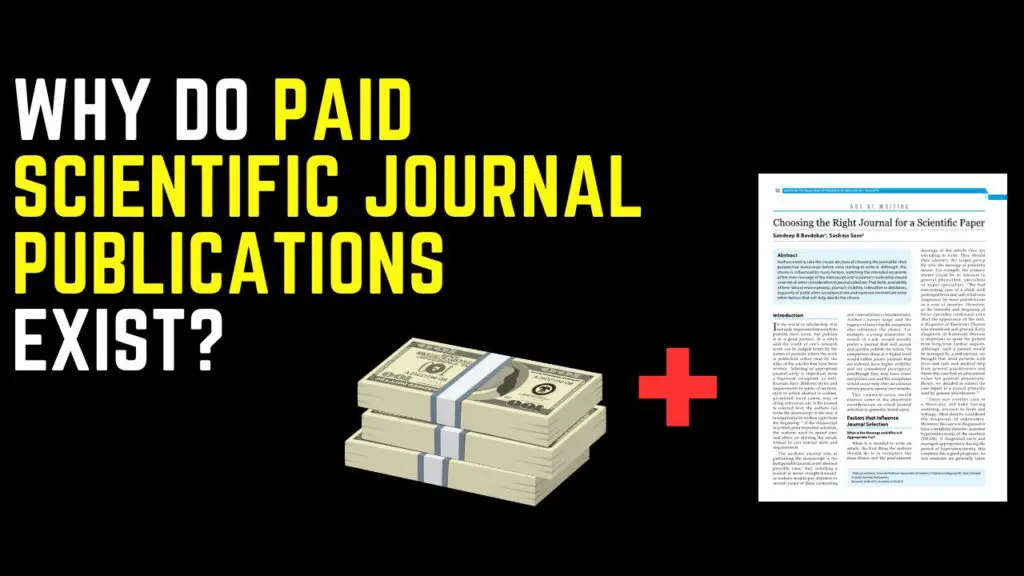The world in which we currently live have been significantly shaped by scientific research and discoveries. However, it can be expensive, time-consuming, and resource-intensive to publish findings in reputable scientific publications.
There are certain scientific journals that provide free access to their papers, while there are others that charge for the publications.
This article will examine what paid scientific journal publications are, why they are necessary, and the effects they have on the scientific community.
What Are Paid Scientific Journal Publications?
Articles, research papers, and other types of intellectual information that demand money to access are referred to as paid scientific journal publications.
These publications are frequently referred to as “subscription-based” or “paywalled” journals since readers must pay to access the material. Usually, a subscription fee or a pay-per-view charge is used to cover the cost.
Why Do Paid Scientific Journal Publications Exist?
The main purpose of paid scientific journal publications is to cover the expenses related to the publication process.
A lot of resources must be put into publishing a scientific article, including hosting website, editorial and peer review services, copy editing and typesetting.
The fees charged by publishers cover these expenses, which guarantees that the journals can keep operating and continue to offer helpful services to the scientific community.
Drawback of Paid Scientific Journal Publications
The fact that paid scientific journal publications restrict access to knowledge is one of their main drawbacks.
For researchers, students, and other stakeholders to stay up to date on the most recent research discoveries and advancements in their field, access to scientific publications is essential.
For researchers from low-income countries and institutions with inadequate resources, the cost of obtaining scientific publications, however, can be a considerable obstacle.
Open Access Journals as an Alternative
Numerous organizations and projects have been launched to encourage open access to scientific publications in order to address this problem. Open access is the process of making scientific publications freely accessible online, free of paywalls or other access restrictions.
Other open-access journals rely on alternate financing sources, like institutional support or contributions, while some charge authors a fee to cover the costs of publication.
Many governments, funding organizations, and academic institutions have established policies requiring academics to make their publications openly available as the open access movement has gained popularity in recent years.
Open-access journals and platforms have increased as a result of this trend, making it simpler for researchers to access and exchange scientific knowledge.
Conclusion
Paid scientific journal publications are an important part of the ecosystem of scientific publishing and offer the scientific community useful services. However, they can also restrict access to scientific knowledge, especially for researchers from institutions and countries with lower incomes.
As a response to this issue, the open access movement has evolved, encouraging the free and public exchange of scientific knowledge to make sure that everyone may profit from advancements in science and technology. We can maintain universal access to scientific knowledge by implementing open-access rules and encouraging open-access journals.
Read More: List of Free Open Access Journals
Other articles
Please read through some of our other articles with examples and explanations if you’d like to learn more about research methodology.
Research
- Finding Scopus Indexed Journals
- List of the Top 100 Google Scholar Journals
- Resources for PhD Literature Review
- Journal Publication Ethics for Authors
- Traditional Research vs. Action Research
- Modern Research vs Traditional Research
- How to Reach a Wider Audience in Research
- Conflict of Interest
- Qualitative Research MCQ Quiz
- Detecting and Addressing Plagiarism
- Research Methodology Quiz
- Do All References in a Reference List Need to Be Cited in Text?
- How to Ask Respondents To Fill Out a Dissertation Survey?
- Co-author Uses ChatGPT for Acedemic Writing. Is it Ethical?
- Article Retraction in Academic Publishing
- Write a 10 and 20-Page Research Paper in One Night
- Journal Submission Hacks
Research
- “et al.”: in APA, MLA, and Chicago Style
- Reasons for Manuscript to Be Rejected
- GPTzero Detects ChatGPT-Generated Research Articles
- Why Do Paid Scientific Journal Publications Exist
- List of Free Open Access Journals
- Conduct Community Member Research Interviews
- Scopus Indexed Journal
- Timeline for Writing a Research Paper in a Month
- Finding Scopus Indexed Journals
- Interesting Facts About Sci-Hub
- Chicago Style Format
- MLA Citations
- APA Citations
- Sci-Hub Proxy Links
- Write Scientific Research Paper Using ChatGPT
- Plagiarism and Paraphrasing
- Q1 Journals: How Q1 Journals are Calculated?
- AI Detection Tools for ChatGPT-Generated Research Articles
- Types of Plagiarism
PhD
- Peer Pressure in PhD Research
- Freelancing Ideas for PhD Researchers
- Consistency in Ph.D. Research
- Cope with a Problematic PhD Supervisor
- Pros and Cons of Being an Older Student in a PhD Program
- PhD Students Seeking Industry Jobs
- Complete PhD in 3 Years
- Highest Paying PhD Degrees
- Completing PhD in 36 Months
- From PhD to Industry: Books to Aid Your Transition
Statistics
Methodology
- Research Methods
- Quantitative Research
- Qualitative Research
- Case Study Research
- Survey Research
- Conclusive Research
- Descriptive Research
- Cross-Sectional Research
- Theoretical Framework
- Conceptual Framework
- Triangulation
- Grounded Theory
- Quasi-Experimental Design
- Mixed Method
- Correlational Research
- Randomized Controlled Trial
- Stratified Sampling
- Ethnography
- Ghost Authorship
- Secondary Data Collection
- Primary Data Collection
- Ex-Post-Facto
- Research Methodology Books
Research
- Table of Contents
- Dissertation Topic
- Synopsis
- Thesis Statement
- Research Proposal
- Research Questions
- Research Problem
- Research Gap
- Types of Research Gaps
- Variables
- Operationalization of Variables
- Literature Review
- Research Hypothesis
- Questionnaire
- Abstract
- Validity
- Reliability
- Measurement of Scale
- Sampling Techniques
- Acknowledgements



